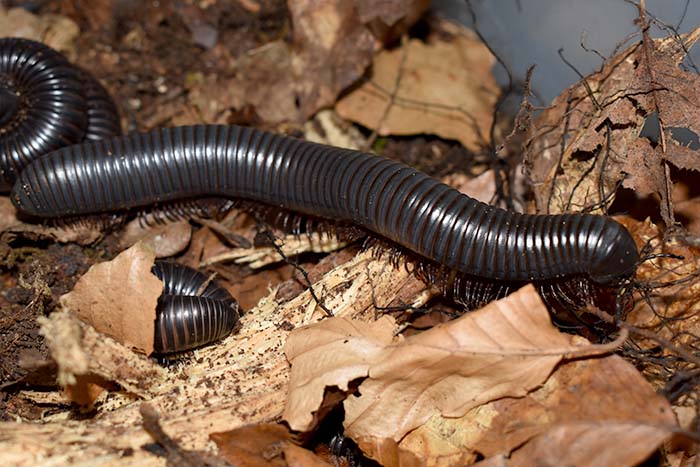Doratogonus sp. “Black Foot”
Black Foot Millipedes
Species Info:
Origin
Lifestyle
Temp
Humidity
Leg Span
Disposition
Suitability
This gentle giants make excellent pets are an ideal first invert and have an expected lifespan of about 7-10 years. Millipedes do not actually have a thousand legs, they usually have between 100-400 (2 sets of legs per body segment). With each molt they add more segments and with new legs.
The housing can be any suitable small aquarium or container that can take a 15 cm depth of leaf mould (either beech or oak) substrate, mixed into this should be a quantity of soft dead wood (approximate. 10%). The substrate should be kept damp but not wet; pieces of bark placed on the surface of the leaf mould act as mulch and help prevent the substrate from drying out too quickly. Most species are easy to keep and breed.
The BIG SECRET of keeping and breeding millipedes is DON’T DISTURB THEM. Now this means that if they vanish out of sight for a few days which is what they tend to do, don’t dig them up to check on them. Millipedes are naturally subterranean and so spend some time out of sight. Also some species build soil chambers both to lay eggs and to moult their skins and each time you dig them up you destroy the chambers and so prevent breeding and prevent moulting which can be very harmful as some species require some weeks to rest in the chamber both before the moult and after as the new skin hardens.
Millipedes feed on soft fruits and vegetables and show a great fondness for cucumber it’s always best to offer a mixture of foods, dusted with extra calcium; this simply means scraping some cuttlefish over your food stuffs. Also remove the food before it moulds usually the next day but do leave it in through at least one night.
